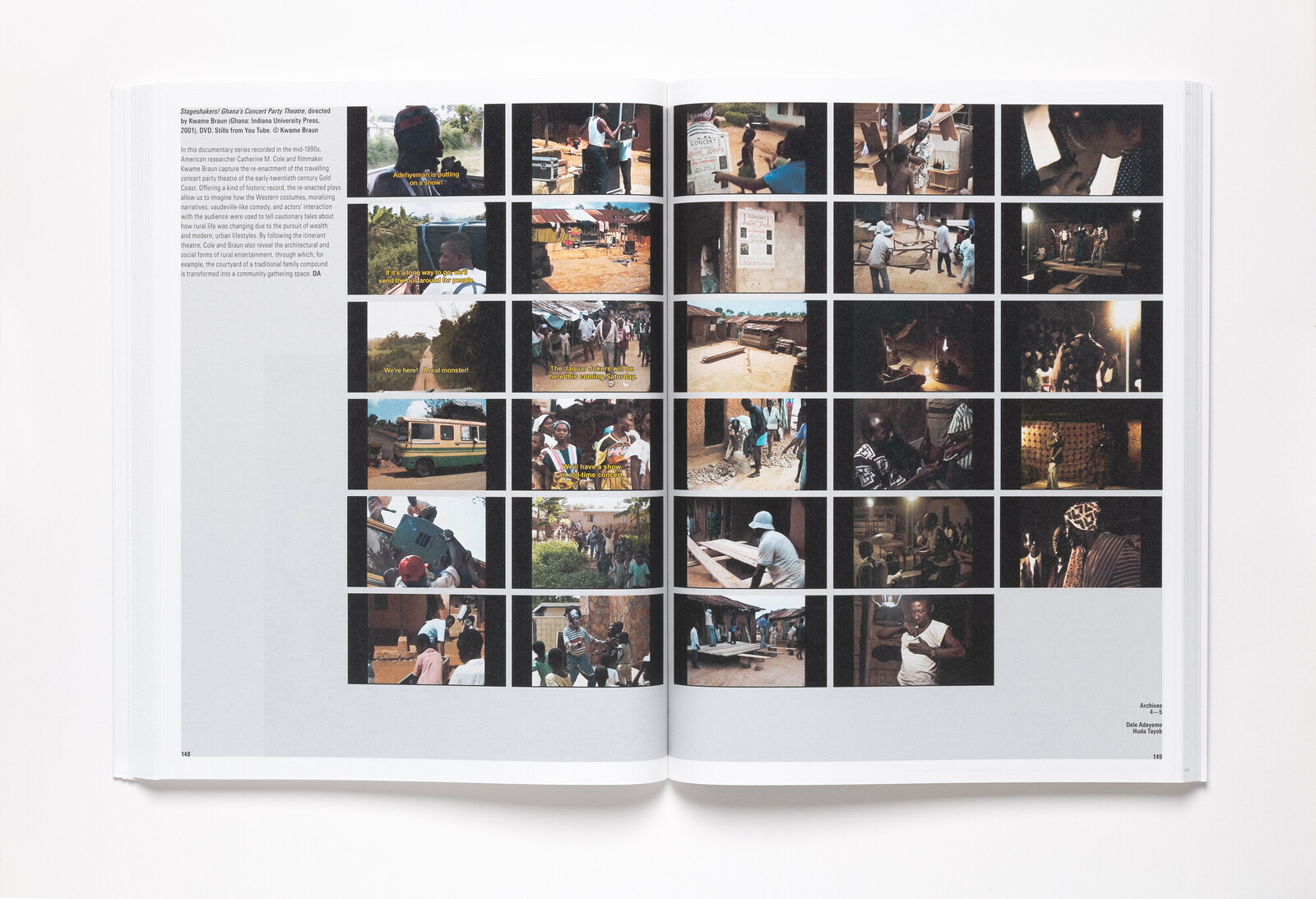Conversations and book launches in Johannesburg, London, and Montreal
1920 rue Baile
Montréal Québec H3H 2S6
Canada
Fugitive Archives: A Sourcebook for Centring Africa in Histories of Architecture is a collective reflection on ways that primary research can shift established bodies of knowledge in architecture, framed by the fellows of Centring Africa: Postcolonial Perspectives on Architecture: Doreen Adengo, Dele Adeyemo, Warebi Gabriel Brisibe and Ramota Obagah-Stephen, Rachel Lee and Monika Motylinska, Ikem Stanley Okoye, Cole Roskam, Łukasz Stanek, and Huda Tayob.
Fugitive Archives is not a book about African architecture or its history. It is a book about the role of primary research in the work of the fellows and about how, to centre Africa in histories of modern architecture, they had to develop new ways of finding, seeing, and listening. The sources presented here are starting points for dismantling and expanding existing architectural archives, in which what is considered valuable enough to archive remains dominated by colonial or Western knowledge frameworks. Through varied media and formats, the sources multiply narratives by highlighting diverse actors, practices, and geographies—on and off the continent—implicated in the history of modern African architecture. Rather than suggesting key, but inevitably reductive, themes, this book brings the fellows and their sources into dialogue in three sections that foreground similar methods and challenges to locating, accessing, reading, and constructing otherwise fugitive archives.
In the first section, Ikem Stanley Okoye, Cole Roskam, and Łukasz Stanek offer a chronology of multilingual personal accounts and manifestos, written mostly from the 1960s through 2010s, which capture the transnational circulation of spatial ideologies, practices, and influences in post-independence Africa. Okoye begins with a source from the 1930s to create a bridge from an early-twentieth-century Nigerian architecture to a postcolonial African one, challenging discourses that foreground non-African genealogies of modernism. Roskam takes personal and commissioned reports by Guinean, Zanzibarian, and Chinese architects or officials as records of the politics underlying global processes of design and construction, which speak to the promises and failures of collective Sino-African architectural production. Stanek presents the voices of four architects (one African American, one Ghanaian, and two Nigerian) who were part of the fundamental, if often contradictory, redefining of disciplinary roles, practices, and responsibilities beyond British precedents, which included reorganizing architectural education and professional structures.
In the second section, Huda Tayob and Dele Adeyemo draw on works of cultural production from the 1950s through 1970s to insist that urban and architectural archives exist if we rethink where to look for them. Tayob reads three films produced in Johannesburg and Dakar as lenses for spatial critique, framing them against three texts, the 1970 “Pan-African Cultural Manifesto” and two excerpts from the FESTAC ’77 African Architectural Technology Exhibition, which speak to the early years of decolonization and the promises of pan-Africanism. Adeyemo uses situated forms of performance—highlife music, the concert party, and the travelling theatre—to demonstrate how sonic culture recorded the impacts of modernization and urbanization on rural and everyday life in Ghana, as the country emerged as a continental leader of independence.
In the third section, Doreen Adengo, Rachel Lee and Monika Motylinska, and Warebi Gabriel Brisibe and Ramota Obagah-Stephen expand what is understood as architectural evidence by arguing for the place of oral histories and ephemera—the gestures unsaid in a conversation, the notes on the margins of a document—in official archives. Such traces figure those implicated in design and construction rather than a final building. Lee and Motylinska bring together fragments of narrative evidence to foreground the positionalities within the office of German architect Georg Lippsmeier and the Institut für Tropenbau, which operated across Africa from 1950 onward. Brisibe and Obagah-Stephen record the voices of community Elders and collect administrative plans, memos, and sketches to compare the layouts, both colonial and postcolonial, of residential quarters for Europeans and Africans in Port Harcourt, Nigeria. While her work will remain unfinished, Adengo’s sources are part of her post-occupancy study of the women’s residences of Makerere University in Kampala, through which she figures the experiences of women within the context of a boom in commissions for foreign, modernist architects in post-independence Uganda.
Fugitive Archives: A Sourcebook for Centring Africa in Histories of Architecture (2023) is edited by Claire Lubell and Rafico Ruiz, with graphic design by Naadira Patel and Fred Swart, and co-published by the CCA with Jap Sam Books.
Join us in Johannesburg, London, and Montreal for conversations as we launch Fugitive Archives:
Lecture at the University of Johannesburg Graduate School of Architecture: September 28, 6:30–8pm
Warebi Gabriel Brisibe and Ramota Obagah-Stephen present their research on courtyard buildings in Old Port Harcourt Township.
Book launch hosted by LAPA Project and Residency Space and Breezeblock Cafe: September 29, 6–9pm
Claire Lubell, Naadira Patel, Fred Swart, Warebi Gabriel Brisibe, and Ramota Obagah-Stephen share reflections on the making of the book, followed by a sonic reaction to the archives by Nombuso Mathibela.
Entrance is free, book tickets here.
Panel discussion hosted by the University of Johannesburg Graduate School of Architecture: September 30, 2–4pm
Warebi Gabriel Brisibe, Ramota Obagah-Stephen, Rachel Lee, Monika Motylinska, Cole Roskam, and Łukasz Stanek present their research, followed by a discussion on writing new architecture histories with Ngillan Faal, Mxolisi Makhubo, and António Tomás. Welcome by Mark Raymond and introduction by Claire Lubell.
The event will be live-streamed. To attend via Zoom, please register here. To attend in-person, please write to gsaevents [at] uj.ac.za.
Book launch at the ArtBar Lounge at the RCA School of Architecture in London: October 5, 7:30pm
Claire Lubell introduces the book and Dele Adeyemo presents his research, followed by a discussion on how the book sits within practices of research, teaching, archiving, and editing with Nana Biamah-Ofosu, Shukri Sultan, and Margarida Waco.
Book launch at the CCA Bookstore: October 19, 5:30pm
Claire Lubell, Rafico Ruiz, Ikem Stanley Okoye, and Alan Dunyo Avorgbedor reflect on the editorial development of the book and critically discuss its potential role in research and pedagogy.
The CCA Multidisciplinary Research Program Centring Africa: Postcolonial Perspectives on Architecture was organized with funding from the Andrew W. Mellon Foundation.
For more about our research, publication and curatorial projects, and to stay in touch, subscribe to our newsletter.

